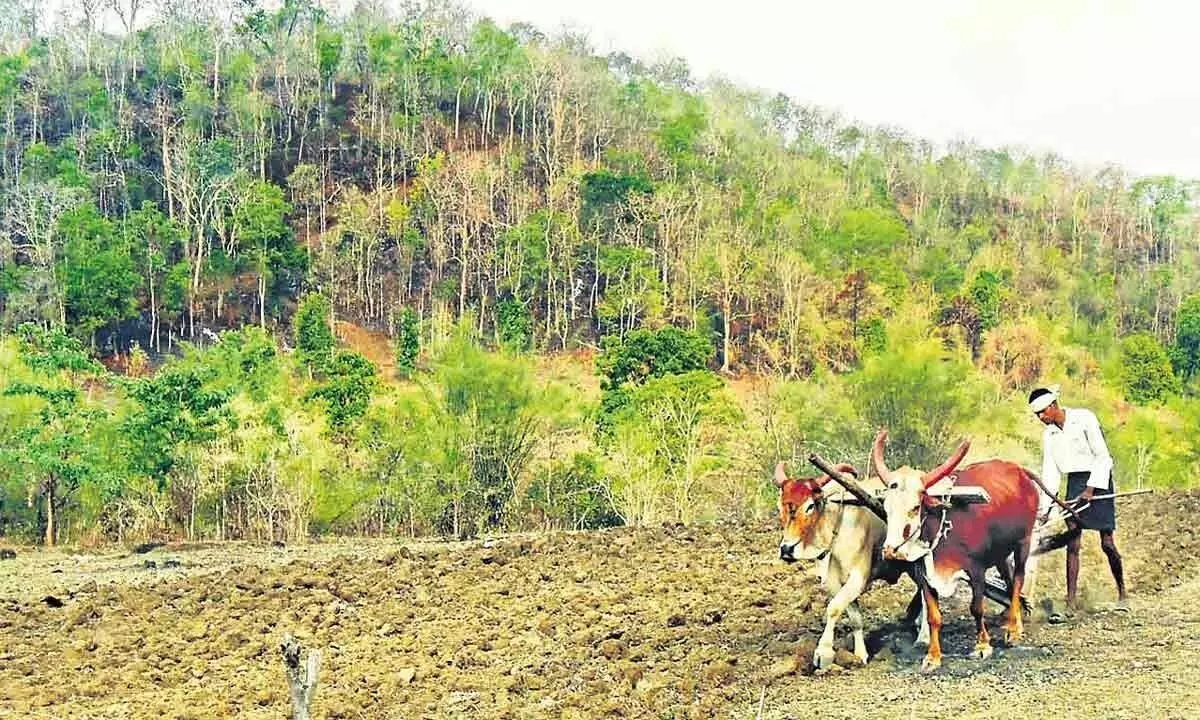Land and its role in tribal development

At the turn of the century, vast stretches of fertile virgin lands allured many a non-tribal to come and settle down in tribal area with or without legal rights.
At the turn of the century, vast stretches of fertile virgin lands allured many a non-tribal to come and settle down in tribal area with or without legal rights.
It was the policy of the government, too, to open up these areas causing influx of new settlers and grant them pattas with a view to augmenting the revenue of the State. Communication networks like roads have facilitated the invading non-tribals, resulting in a state of internal colonisation.
The concept of having permanent rights over lands under their own cultivation for generations was alien to the tribals. The patta given by the successive governments was no more than a piece of paper to them. By the time they understood relevance of such a thing, sizeable extents of land had gone into the hands of the non-tribals.
Unlike the British Agency, the Nizam government did not have any concrete policy or a statute to protect the landed interests of tribals. A huge extent of land was un-surveyed and sub-divided on ground but shown in revenue maps. These lands were allotted by the corrupt revenue officials on Sivaijamabandi tenure basis, favouring the wealthy and knowledgeable non-tribals at the expense of the innocent and illiterate tribals.
There existed non-villages classified in the revenue records. These villages have never been notified under the provisions of the Forest Act but the forest department stakes claim over thousands of acres of land under the cultivation of tribal families. These villages happen to adjoin or are surrounded by tree growth. Ancient tribal habitations were surreptitiously notified as Reserve Forest, through these villages were Gram Panchayats. There were tribal villages that were surveyed but settlement records not implemented. This sort of hypothetical and theoretical claims resulted in never ending forest and revenue friction, causing serious damage to the interests of tribals. Land ownership occupancy inconceivably became complex in tribal tracts, leading to the iatrogenic effect.
The doctors of the land i.e., the revenue department had administered fatal drugs down the ages and created pathological problems pertaining to land. Strangely, where tribals, who had lands, had no title and those, who had no title, had lands. Strikingly, in a few villages, the settlement records of 1927 and that of 1960 were together recorded in the pahani, creating profound confusion and endless litigation. Basic land records like village map, sethwar, khasra pahani and vasool baqui were not available, leaving the field open to exploiters.
In the recent years, although several admirable and progressive legislations were enacted to protect and promote the interests of tenants, small and marginal farmers, landless agriculture labourers in general and tribals in particular had not yielded desired results because of the mess created by the state instruments of status quo. Tenancy laws, land reforms and prevention of encroachment of assigned lands etc., had no impact. This fact had eroded the confidence of a tribal in the fairness of administration and credibility of the government institutions as instruments of progressive transformation.
Though, the Scheduled Areas Land Transfer Regulation 1959 came into operation in 1963, its effective implementation was delayed up to 1981. Though the implementation of this Act reversed the downhill side, several other problems outside the purview of Land Transfer Regulation (LTR) remain unsolved till today. It is pertinent that only 20% of total lands in an agency village are patta lands and the remaining 80% government lands remain unaltered by the LTR.
Keeping these issues in mind, the government created new Agency Revenue Divisions throughout the State supported by special survey units styled as Telugu Girijana Magana Samaardhana in 1987, thanks to the then Chief Minister’s initiative. An intensive exercise was taken up in these Agency/Revenue Divisions to provide comprehensive and time-bound solutions to the prevailing land problems that had plagued the tribals for several decades.
The village courts headed by the Agency Divisional Magistrate/Sub-Collector are held involving all the stakeholders along with the president of mandal praja parishad, sarpanch and all others who choose to attend these courts on notified dates in advance. The issues are framed. The legal position is placed before the village assembly for consideration. The issue is decided with the active participation of the entire community strictly in accordance with the law. No lawyers. No wrangling. No adjournments. Complicated issues are clarified. Locals’ opinions are respected but within the framework of the Agency Rules. Judgment is made known, case by case, on the spot and in cases where possession of the land has to be delivered, it is done subsequently without any delay. Thus, thousands of land issues are amicably settled through this medium of village courts. A new era!
(The writer is formerly
Sub-collector, Utnoor,
Adilabad district)















